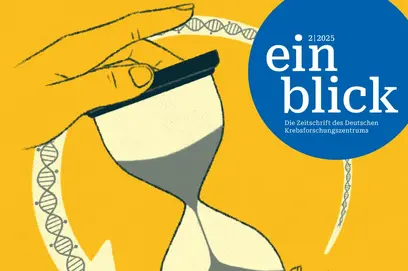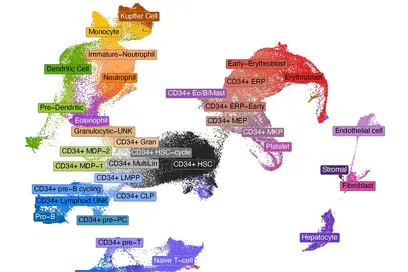Natürliche Killerzellen, kurz NK-Zellen - hinter diesem martialischen Namen verbirgt sich eine wichtige Komponente des angeborenen Immunsystems. Im Gegensatz zu den T-Zellen des Immunsystems, die spezifische Zielstrukturen erkennen müssen um aktiv zu werden, sind NK-Zellen jederzeit einsatzbereit: Sie töten gezielt solche Körperzellen ab, die ihren molekularen Identitätsnachweis, das MHC-Klasse I-Molekül, verloren haben. Dies passiert etwa im Verlauf einer Virusinfektion oder bei der Entartung zu Krebs.
NK-Zellen gelten daher als wichtiger Verteidigungsmechanismus des Körpers gegen Krebs. Zahlreiche Untersuchungen haben bereits bestätigt, dass Krebspatienten, in deren Tumoren sich reichlich NK-Zellen fanden, eine besonders gute Prognose haben. Dr. Adelheid Cerwenka und ihr Team im Deutschen Krebsforschungszentrum prüften nun an Mäusen, welche Faktoren dafür verantwortlich sind, dass NK-Zellen in einen Tumor einwandern.
Die Forscher zeigten, dass der Immunbotenstoff gamma-Interferon eine entscheidende Rolle spielt: Mäuse überleben eine Transplantation von Lymph- oder Hautkrebszellen im Durchschnitt 25 Tage. Werden die Krebszellen jedoch auf Mäuse übertragen und dabei gleichzeitig das gamma-Interferon ausgeschaltet, so sterben die Tiere früher, ihre Tumoren enthalten weniger NK-Zellen. Die Immunologen konnten auch aufklären, dass der Immunbotenstoff nur indirekt auf die NK-Zellen wirkt: Offenbar regt das gamma-Interferon im Tumor die Bildung eines weiteren Signalmoleküls an. Diese Substanz mit dem Namen CXCL10 lockt gezielt solche NK-Zellen, die den dazu passenden Rezeptor auf ihrer Oberfläche ausbilden, ins Krebsgewebe. Je mehr Signalmolekül im Tumor entsteht, desto mehr NK-Zellen wandern ins Krebsgewebe und umso länger überleben die Mäuse.
Aus medizinischer Sicht ist besonders interessant, dass sich der Effekt auch “von außen“ beeinflussen lässt. So werden NK-Zellen auch dann angelockt, wenn den Mäusen biotechnologisch hergestelltes gamma-Interferon oder CXCL10 in die Geschwulst gespritzt wird. “Das macht das Ergebnis so spannend“, freut sich Studienleiterin Adelheid Cerwenka. “Denn so können wir möglicherweise Tumortherapien unterstützen, indem wir dem Krebs gezielt die Natürlichen Killerzellen auf den Hals hetzen.“
Marco Wendel, Ioanna E. Galani, Elisabeth Suri-Payer und Adelheid Cerwenka: Natural Killer Cell Accumulation in Tumors Is Dependent on IFN-γ and CXCR3Ligands
Cancer Research 2008, Doi:10.1158/0008-5472.CAN-08-1440
Über das DKFZ
Das Deutsche Krebsforschungszentrum (DKFZ) ist mit mehr als 3.000 Mitarbeiterinnen und Mitarbeitern die größte biomedizinische Forschungseinrichtung in Deutschland. Wissenschaftlerinnen und Wissenschaftler erforschen im DKFZ, wie Krebs entsteht, erfassen Krebsrisikofaktoren und suchen nach neuen Strategien, die verhindern, dass Menschen an Krebs erkranken. Sie entwickeln neue Methoden, mit denen Tumoren präziser diagnostiziert und Krebspatienten erfolgreicher behandelt werden können. Beim Krebsinformationsdienst (KID) des DKFZ erhalten Betroffene, Interessierte und Fachkreise individuelle Antworten auf alle Fragen zum Thema Krebs.
Um vielversprechende Ansätze aus der Krebsforschung in die Klinik zu übertragen und so die Chancen von Patientinnen und Patienten zu verbessern, betreibt das DKFZ gemeinsam mit exzellenten Universitätskliniken und Forschungseinrichtungen in ganz Deutschland Translationszentren:
- Nationales Centrum für Tumorerkrankungen (NCT, 6 Standorte)
- Deutsches Konsortium für Translationale Krebsforschung (DKTK, 8 Standorte)
- Hopp-Kindertumorzentrum (KiTZ) Heidelberg
- Helmholtz-Institut für translationale Onkologie (HI-TRON) Mainz – ein Helmholtz-Institut des DKFZ
- DKFZ-Hector Krebsinstitut an der Universitätsmedizin Mannheim
- Nationales Krebspräventionszentrum (gemeinsam mit der Deutschen Krebshilfe)
Das DKFZ wird zu 90 Prozent vom Bundesministerium für Forschung, Technologie und Raumfahrt und zu 10 Prozent vom Land Baden-Württemberg finanziert und ist Mitglied in der Helmholtz-Gemeinschaft Deutscher Forschungszentren.


